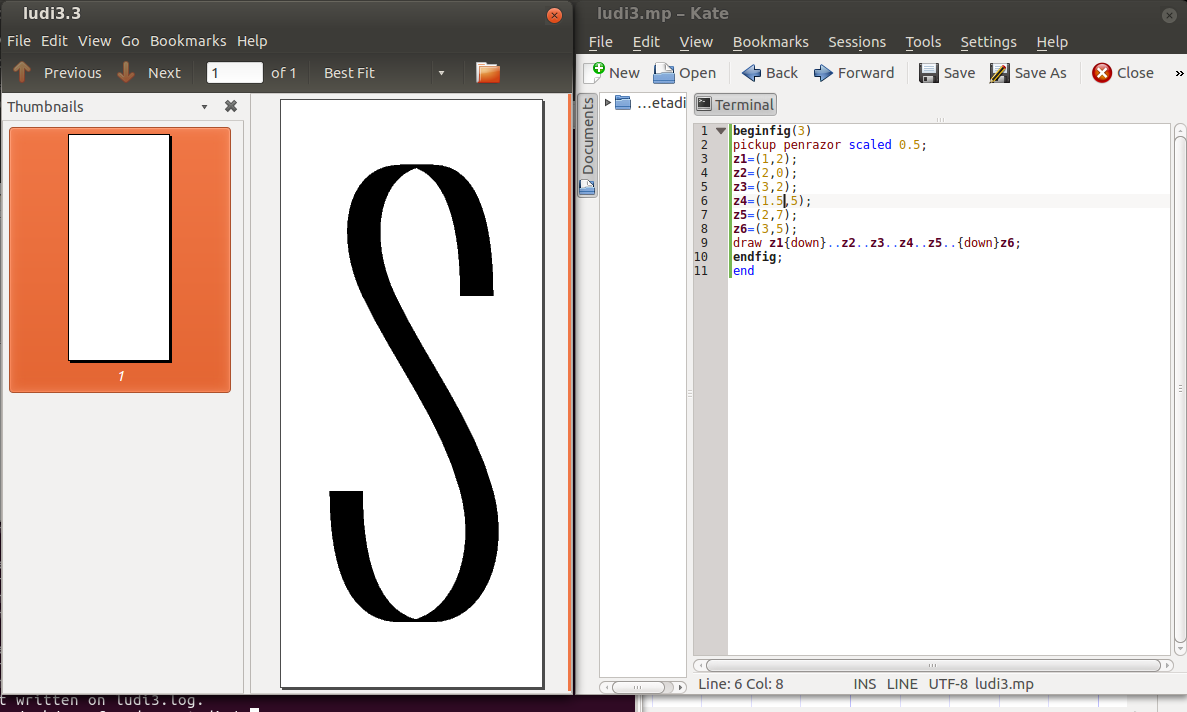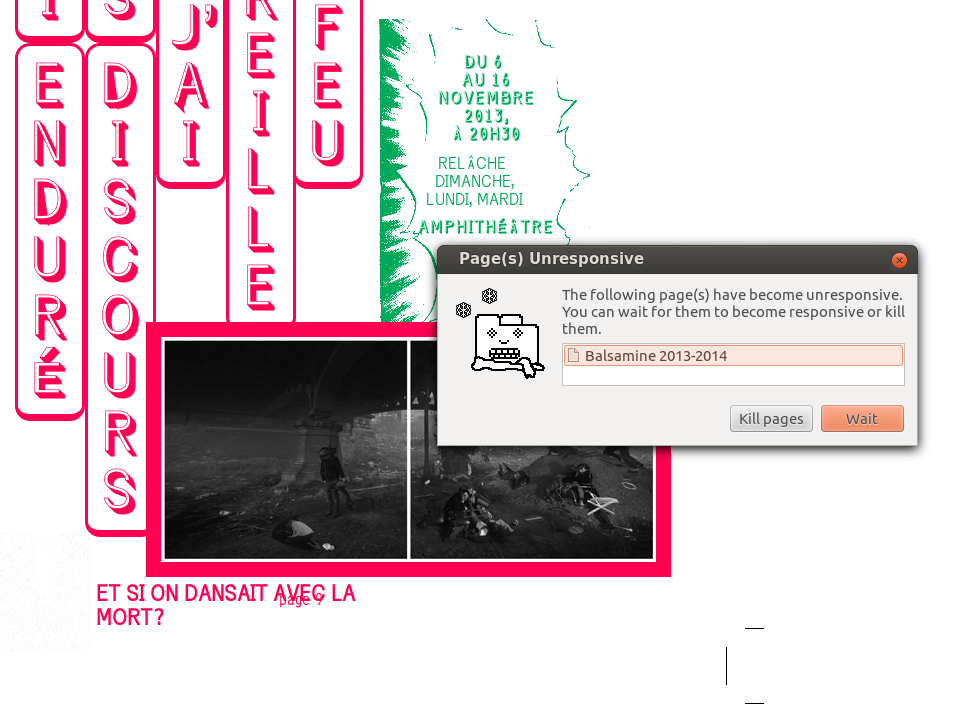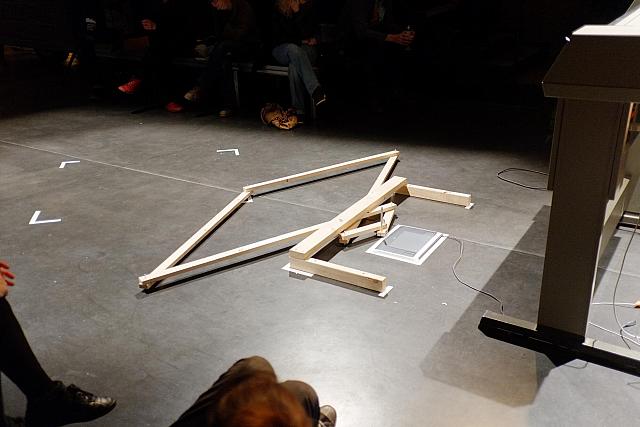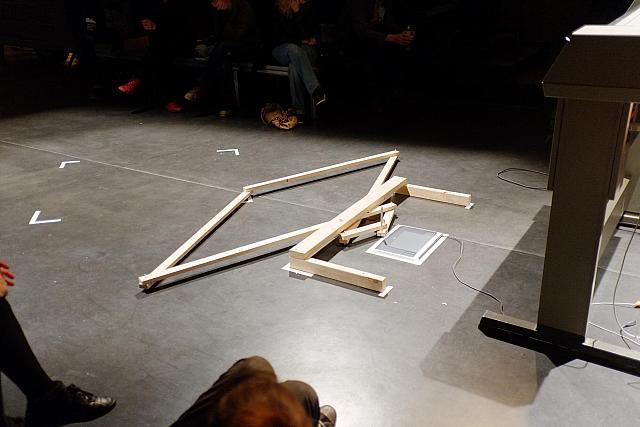


«You can't bullshit a bullshitter.»
«Welcome to the wonderland of free software! alternative software, retro look, pdf version 1.3. Peace of mind vectorization, legal photoshoping, text processing and font making.»
«Then slowly you realize you're actually making new things with new things!»
«As a tourist in this free territory, you forget about the adobe holy trinity: Illustrator™ / Photoshop™ / Indesign™.»
The design caravan Open Source Publishing invites you for a design education experiment this August — from 26 till 30. Please spread this around to students, designers, teachers, institutions and friends you feel might be interested.
By and large, graphic design students bring a laptop to school, and create their work using digital software tools. This hard- and software represent a technological and cultural heritage that is seldomly questioned, and a potential that goes unexploited. Using free and open source software and engaging in its culture provide an alternative by allowing a design with a more intimate and experimental relation with its tool.Beyond the implications for the design practice, the culture of free and open source software challenges traditional education paradigms because knowledge is exchanged outside institutional borders, and participants move between roles easily (teacher, student, developer, user). Moving beyond their series of workshops and print parties, OSP propose a summer school experiment. A first try to move across the conventional school model toward a space where the relationship to learning is mediated by the graphical software.



3 worksessions running in parrallel, with international guests to be confirmed in the coming week.
On translations, from big to small, from analog to digital, and vice versa.
This worksession focuses on mediation, translation and communication. Meeting computer tools and formats implies to know the extent, the weight and scale of these otherwise virtual entities.
At the translation between analog gesture and digital format the notion of scale becomes pertinent. Going from digital to analog, we are used to seeing a discrete logic of blobs as produced by the print head of the inkjet printer. But 1980s technology of plotting tables shows that a printer can also be commanded in a much more gestural and continuous style.
From a small scale to a large scale and from large to small, what tools can we use for this translation? What is lost in the scaling ? Can we measure the approximation, the distance between instructions and graphical interpretation ?
Rediscovering fonts through their skeleton, the gesture of the body and their translation by digital tools.
The starting point is the notion of skeleton, of line, of path, of stroke. This approach of drawing interests us particularly because it returns without any doubt to the first ever trace of movement: the line left on the soft ground by the movement of a part of the body, and then of a tool. Are then immediately brought into play gesture, body, movement, distance, constraint, tool and then the trace and with it the possibility of reading.
As technical construction, intellectual and cultural, software embody specific conceptions on the objects they manupulate (here, stroke and shape). The PostScript programming language, commonly used in fonts, describe the glyphs by their outline rather than by their skeleton, hence leading to a particular conception of the letter. The Metafont language rather describe the skeleton of the letter, trying to return to the gesture of the hand and the thickness of the nib.
The third worksession will be elaborated by/in collaboration with students/teachers from KASK – The Royal Academy of Fine Arts in Ghent.
We will host the
worksessions at Constant Variable, 80 rue Gallait, Brussels, a house where Constant vzw is in
residency until Summer 2014.
Meals will be provided; we can help you find lodging.
Mainly English, but French and Dutch are spoken too.
We applied for subsidies in order to finance as much as we can food, lodging, travels for invited guests and participants ; we will obtain the answer beginning of July.
If we get this subsidy, then participating to the school is free of charge and includes lunches. If we don't get it, we will ask 200€ per person for the whole week. Please tell us if you can come in any case or just in the first case.
Send an e-mail to mail@osp.constantvzw.org, before July 15th, including a short description of your projections and speculations about these ateliers. The number of places is limited to 24.
=======«You can't bullshit a bullshitter.»Louison Coulom
«Welcome to the wonderland of free software! alternative software, retro look, pdf version 1.3. Peace of mind vectorization, legal photoshoping, text processing and font making.»Louison Coulom
«Then slowly you realize you're actually making new things with new things!»Louison Coulom
«Will I ever be the same again?»
«When is the next version coming out?»
«As a tourist in this free territory, you forget about the adobe holy trinity: Illustrator™ / Photoshop™ / Indesign™.»Louison Coulom
I've been 100% legal for the first time in my life.Jules Vaulont
De ontwerpcaravan Open Source Publishing nodigt u uit voor een zomers experiment met ontwerponderwijs — van 26 tot en met 30 augustus 2013
De meeste ontwerpstudenten brengen een laptop mee naar school en creëren hun werk met behulp van digitale software tools. Maar hun hard-en software is een technologisch en cultureel erfgoed dat zelden kritisch wordt bevraagd en een potentieel dat onbenut blijft. Door vrije software te gebruiken en in contact te komen met de cultuur errond wordt een ontwerppraktijk mogelijk die een intiemere en meer experimentele relatie met zijn digitale gereedschapskist heeft.
Behalve implicaties voor de (grafische) ontwerppraktijk zelf, heeft de cultuur van vrije software ook gevolgen voor het traditionele onderwijsparadigma omdat kennis buiten institutionele kaders wordt uitgewisseld en deelnemers gemakkelijk van rol veranderen (ze zijn afwisselend docent, student, ontwikkelaar en gebruiker). Geinspireerd op hun reeks workshops en Print Parties stelt OSP daarom dit zomers schoolexperiment voor.
Let op: Inschrijven voor 4 juli.

The design caravan Open Source Publishing invites you for a design education experiment this summer— from 26 up until 30 August *
By and large, graphic design students bring a laptop to school, and create their work using digital software tools. This hard- and software represent a technological and cultural heritage that is seldomly questioned, and a potential that goes unexploited. Using free and open source software and engaging in its culture provides an alternative by making a design practice possible with a more intimate and experimental relation to its toolbox.
Beyond the implications for design practice, the culture of free and open source software challenges traditional education paradigms because knowledge is exchanged outside institutional borders, and participants move between roles easily (teacher, student, developer, user). Following from their series of workshops and Print Parties, OSP proposes a summer school experiment. A first try to move across the conventional school model towards a space where the relationship to learning is mediated by graphical software.
The Relearn summer school consists of 3 worksessions that will be running in parallel. Each session is animated by two or more members of OSP plus international guests. While topics differ per session, in each of the sessions we will use methods and tools that we have experimented with over the last few years such as distributed version control, live-code and performative design.
On translations, from big to small, from analog to digital, and vice versa.
This worksession focuses on mediation, translation and communication. Meeting computer tools and formats implies to know the extent, the weight and scale of these otherwise virtual entities.
At the translation between analog gesture and digital format the notion of scale becomes pertinent. Going from digital to analog, we are used to seeing a discrete logic of blobs as produced by the print head of the inkjet printer. But 1980s technology of plotting tables shows that a printer can also be commanded in a much more gestural and continuous style.
From a small scale to a large scale and from large to small, what tools can we use for this translation? What is lost in the scaling? Can we measure the approximation, the distance between instructions and graphical interpretation?

Rediscovering fonts through their skeleton, the gesture of the body and their translation by digital tools.
The starting point for this worksession is the notion of skeleton, of line, of path, of stroke. This approach of drawing interests us particularly because it returns without any doubt to the first ever trace of movement: the line left on the soft ground by the movement of a part of the body, and then of a tool. Are then immediately brought into play gesture, body, movement, distance, constraint, tool and then the trace and with it the possibility of reading.
As technical construction, intellectual and cultural, software embodies specific conceptions of the objects they manupulate (here, stroke and shape). The PostScript programming language, commonly used in fonts, describe glyphs by their outline rather than by their skeleton, hence leading to a particular conception of the letter. The Metafont language rather describes the skeleton of the letter, trying to return to the gesture of the hand and the thickness of the nib.

The third worksession will be elaborated by/in collaboration with students/teachers from KASK – The Royal Academy of Fine Arts in Ghent. Tutors involved: Diane Steverlynck (textile design), Bram Crevits (graphic, web & interactive design), Wouter Decorte (multimedia design).
We will host the
worksessions at Constant Variable, 80 rue Gallait, Brussels, a house where Constant vzw is in
residency until Summer 2014.
Meals will be provided; we can help you find lodging.
Mainly English, but French and Dutch are spoken too.
To finance this initiative we ask a contribution of 200 euros per participant. This covers lunches, fees and transport for tutors and invited guests. We have applied for subsidies to support the Summer school. In case of a positive answer, the school will be gratis and/or we will pay your money back. We’ve happily received a positive answer from the Vlaamse Gemeenschap to cover lunches, fees and transport for tutors and invited guests, so the school will be gratis for all. We will also try to manage accomodations for people who need any; please let us know if you're looking for a place to stay.
The school is not dedicated to students only, but to anyone who would like to experiment new learning situations around graphic design and free software.
The number of places is limited to 24. Please send an e-mail to
mail@osp..constantvzw.org
before July 4 th until July 10 at 12h00, including a short description of your
projections and speculations about these ateliers and what you would like to share. We will let you know if you are selected the same day.
Sorry, the deadline for subscriptions is over now. We will try to set up a live stream for collective restitutions of the workshops. Keep looking for updates on this page or subscribe to OSP newsletter to get informed. We will also distribute a publication after the school is over, let us know if you are interested in receiving one.
* Please spread this call to students, designers, teachers, institutions and friends you feel might be interested.
Relearn Summer school is supported by the Vlaamse Gemeenschap.
Constant Variable is supported by the Vlaamse Gemeenschapscommisie.